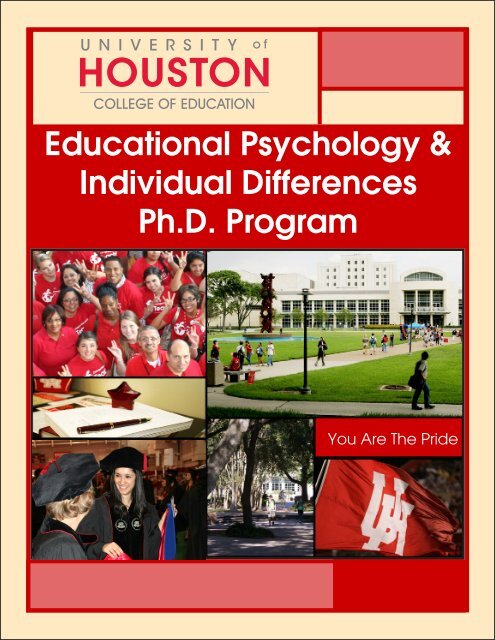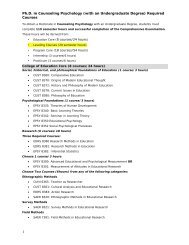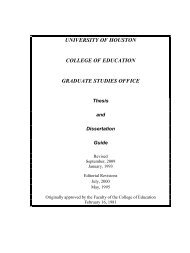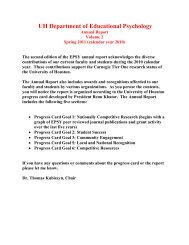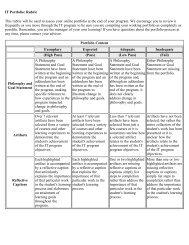Educational Psychology & Individual Differences Ph.D. Program
Educational Psychology & Individual Differences Ph.D. Program
Educational Psychology & Individual Differences Ph.D. Program
Create successful ePaper yourself
Turn your PDF publications into a flip-book with our unique Google optimized e-Paper software.
UH <strong>Educational</strong> <strong>Psychology</strong> & <strong>Individual</strong> <strong>Differences</strong> <strong>Ph</strong>.D. <strong>Program</strong>In addition to core courses, students can choose one of five specialization areas:• Learning and Development: Focus is on individuals and how their learning, motivational,cognitive, and related processes develop across the lifespan. Students complete electivecoursework in areas such as cognitive and social development, motivation, and self-regulatedlearning.• Special Populations and Exceptionalities: Focus is on exceptionalities and the academicand social/behavioral challenges that individuals face, including the range of specialneeds from gifted and talent development education through education for students withdisabilities. Students complete elective coursework in areas such as learning and behavioralchallenges/disabilities, talent development, and research with low incidence populations.• Research Methods, Measurement, and Statistics: Focus is on advanced statistics, measurement,research methods, and educational assessments. Students complete electivecoursework in areas such as hierarchical linear modeling, survey methods, structural equationmodeling, analysis of change, and item-response theory.• Higher Education: Focus is on postsecondary institutional contexts of learning. Studentscomplete elective coursework in areas such as the administration of higher education, legalissues in postsecondary education, theories of organizational development, and history andphilosophy of higher education.• Health Promotion and Behavioral Community Interventions: Focus is on the development,implementation, and evaluation of community health and minority issues as theyrelate to individual health behaviors in educational settings, community agencies, and otherinstitutions. Students complete elective coursework in areas such as educational programsfor health, administering health programs, minority health issues, and program evaluation inhealth education.3
UH <strong>Educational</strong> <strong>Psychology</strong> & <strong>Individual</strong> <strong>Differences</strong> <strong>Ph</strong>.D. <strong>Program</strong>This <strong>Ph</strong>.D. degree draws on multiple theoreticaland interdisciplinary perspectives and researchparadigms with the goal of developing andapplying cutting-edge scientific knowledge in<strong>Educational</strong> <strong>Psychology</strong> and <strong>Individual</strong><strong>Differences</strong>.Learning &DevelopmentSpecialPopulations &ExceptionalitiesResearch Methods,Statistics &MeasurementHigherEducation<strong>Educational</strong><strong>Psychology</strong> &<strong>Individual</strong><strong>Differences</strong>HealthPromotion &Behavioral CommunityInterventionsFoundational CourseworkTheoretical & Historical Foundations of <strong>Educational</strong> <strong>Psychology</strong>Research Methods, Statistics, & Measurement4
UH <strong>Educational</strong> <strong>Psychology</strong> & <strong>Individual</strong> <strong>Differences</strong> <strong>Ph</strong>.D. <strong>Program</strong>Our program might fit your needs if you:• Want to extend your abilities to help students learn and achieve in multipleeducational settings.• Want to design, conduct, and use research to understand and help solve theproblems facing schools and communities nationally and internationally.• Want to learn and apply empirically-based student success strategies in the contextof higher education.• Want to develop and evaluate health programs in schools and other settings.• Want a rigorous, competitive program of coursework that also provides students theflexibility to pursue their own areas of academic interest.• Have an interest and want a career in a growing area of educational psychology.Graduates have gone to positions such as:• Director of campus improvement and research for a large school system.• Directors of instruction, special education, and talent development in public schools.• Researchers in Research and Accountability Divisions of school systems.• Education or research specialists in medical institutions.• Independent consultants (e.g., in measurement, special education, or programevaluation).• Faculty or administrators in universities and community colleges.• Research specialists for U.S. Department of Education and other federal/ state/localgovernment institutions or agencies.• Project manager for private research organizations.“Thanks to my degree in <strong>Educational</strong> <strong>Psychology</strong>, I gota position working for the federal government in the U.S.Department of Education. The program offered greatindividual support. There was never a time I couldn’t go tofaculty for help. I knew people at other universities who didnot have that good an experience.”- Loveen Bains, <strong>Ph</strong>.D., Alumna5
UH <strong>Educational</strong> <strong>Psychology</strong> & <strong>Individual</strong> <strong>Differences</strong> <strong>Ph</strong>.D. <strong>Program</strong>CourseworkIn the first year of studies, students are required to enroll in 9 hours of coursework eachsemester.Total number of coursework hours: minimum 69 hours.Theoretical and Historical Foundations of<strong>Educational</strong> <strong>Psychology</strong> (21 Hours)Students are required to complete sevencourses that provide them a broad foundationin major theoretical and empirical traditionswithin educational psychology (e.g., historyand philosophy of psychological systems;educational psychology; learning theory;advanced topics in human development;current issues in education).Research Methods, Statistics and Measurement Core (21 Hours)Students are required to complete seven courses that provide them the backgroundand expertise necessary to design and conduct research within the field of educationalpsychology (e.g., advanced educational and psychological measurement; researchmethods; intermediate statistics; multivariate statistics).Independent Research Experiences (minimum 9 hours)Students in the EPSY-ID program are required to satisfy two major research requirements:(1) the candidacy research paper, and (2) a doctoral dissertation. Both of these projectstypically involve the collection, analysis, and interpretation of quantitative and/or qualitativedata with supervision and guidance from an advisor and committee of faculty.Specialization Electives (minimum 18 hours)Students in the program are required to pursue one of the five specialization areas. Theseareas include Learning & Development; Special Populations & Exceptionalities; ResearchMethods, Measurement & Statistics; Higher Education; Health Promotion and BehavioralCommunity Interventions. Although all students in the program gain some background inthese areas through the <strong>Program</strong> Area Core courses, students within each area add to theirexpertise by selecting electives relevant to a particular area of specialization.6
UH <strong>Educational</strong> <strong>Psychology</strong> & <strong>Individual</strong> <strong>Differences</strong> <strong>Ph</strong>.D. <strong>Program</strong><strong>Program</strong> Faculty and Research InterestsDr. Weihua FanAssociate ProfessorQuantitative research methods and their applications to educational issuesunder the umbrella of motivational and cognitive processes relating to studentsuccess.Dr. Jacqueline HawkinsAssociate Professor & Associate Dean of OperationsSystems change in educational and community contexts; academic andbehavioral interventions that respond to the needs of special populations.Dr. Catherine HornAssociate ProfessorSystemic barriers to college access and success for traditionally underrepresentedstudents; K-12 high stakes testing; college admission and placementpolicy.Dr. Lyle McKinneyAssistant ProfessorImpact of higher education policy and finance on the success of studentsfrom lower socioeconomic backgrounds, particularly those attending communitycolleges.Dr. Richard OlenchakProfessor, Director of Urban Talent Research Institute & Department ChairGifted & talented population’s affective development and psychosocialuniqueness.Dr. Norma OlveraAssociate ProfessorAssessing determinants of childhood obesity and developing communitybasedinterventions designed for Latino and African-American populations.7
UH <strong>Educational</strong> <strong>Psychology</strong> & <strong>Individual</strong> <strong>Differences</strong> <strong>Ph</strong>.D. <strong>Program</strong><strong>Program</strong> Faculty and Reserach InterestsDr. Alexander F. SchiltProfessorUniversity organization, leadership, governance and philanthropy.Dr. Paula M. ShortDistinguished Professor & Director of Institute for Policy, Research, & EvaluationImpact of higher education reform on student access, success, and completion; roleof organizational culture in academic quality work in higher education; variablesimpacting college readiness and effective collaboration between k-12 and highereducation; leadership in organizations for organizational change and restructuring asit relates to effectiveness.Dr. Margit WiesnerAssociate ProfessorLongitudinal analysis and latent variable modeling; development of delinquency/health-riskbehaviors; acculturation processes.Dr. Christopher WoltersProfessorMotivational and metacognitive aspects of self-regulated learning.Dr. Shirley YuAssociate ProfessorRelations of cognitive learning strategies and motivation to school achievement,emphasizing female and ethnic minority students in STEM.Dr. Yali ZouProfessor & Director of the Asian American Studies CenterCross-cultural and transnational understanding; social and political contextsof learning; academic acheivement motivation and ethnic Identities; ethnographicresearch in education.8
UH <strong>Educational</strong> <strong>Psychology</strong> & <strong>Individual</strong> <strong>Differences</strong> <strong>Ph</strong>.D. <strong>Program</strong>It’s a Great Time to be a Cougar!Profit from the interdisciplinary focus of the <strong>Educational</strong> <strong>Psychology</strong>& <strong>Individual</strong> <strong>Differences</strong> program and its rigorous courseworkin a competitive program at Houston’s Carnegie-Designated Tier1 urban research university. Engage in research with national andinternational program faculty!We look forward to helping you achieve your career goals!www.coe.uh.edu10


